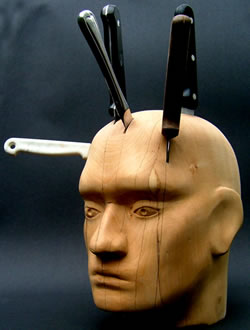Critical Condition

Of the countless American conceits (Americans as a "forgiving people" always makes me laugh), the notion that "critical thinking" is valued remains the most curious. This myth's allure is obvious and pleasing, much like white people who've convinced themselves that they're not racist. Playing pretend is an American specialty, with billions spent to encourage and reinforce the fantasy. Perhaps for the best. If we behaved as we really are, who knows how deep the meat chute would run?
Also, playing pretend helps weed out non-believers and tourists. One's rise or fall depends largely on how well you internalize the narrative. To write for the New York Times, for example, you have to seriously believe that the United States is a force for Good in the world, sometimes mistaken, but always sincere. I've known or chatted up a smattering of Timespeople, and while privately they were some of the most cynical types I've ever met, none of their personal critiques would appear in the Times, simply because they'd never dare submit such nonsense. And these are supposedly the "smart ones," those who set the journalistic/critical/aesthetic standard.
Given this, what does "critical thinking" actually mean? Linda Elder, president of the Foundation for Critical Thinking, laid it out recently in the Christian Science Monitor:
"Critical thinking is self-guided, self-disciplined thinking that aims to take the reasoning we all do naturally to a higher level. It is the art of analyzing and evaluating with the goal of improving thought."
Within this generalization lies the essential truth: "critical thinking," as understood by educated Americans, isn't literally about "improving thought," but improving and streamlining acceptable thought -- that is, if you want to matter inside the PR mills. Actual critical thinking may help you if you're in science or medicine, but in politics and media, it's the crassest leper's bell, painted purple, wired for symphonic sound. Yet the concept of "critical thinking" is very much in fashion, as was the New Seriousness after the Towers fell. Obama is the main symbol of this conceit, his sexy, rolled-up sleeve spirit there to inspire the rest of us.
Of course, apart from some minor remodeling and a slightly better soundtrack, nothing substantial will change, simply because too many people don't want substantial change. One of the benefits of our financial meltdown is how attractive it makes the status quo look by comparison. Oh, there's plenty of gab about "excess" and "frugality," but at bottom, numerous people, especially educated ones, want to maintain whatever perks they've enjoyed, and will do what they must to protect what they have left.
Such degraded conditions are anathema to real critical thinking -- if anything, this inspires further devotion to the main narratives. Think all those reporters who've lost their jobs are gonna become an army of I. F. Stones? It's a nice idea, and if probable, I'd certainly champion it. But as you can see, there's no money or honor in such tawdry pursuits. If you want to eat using your words, become really good at selling shit. That's where critical minds are most needed. As Elder put it: "When making a decision, [critical thinking] is the difference between weighing information to come to a logical conclusion and making snap judgments without understanding the information."
Elder may not have been describing branding, but hers is an accurate definition. It takes a discerning, disciplined mind to read demo reports and successfully translate that into marketing terms. Team Obama showed how it was done in 2008, bringing us to this present, passive stage. From the looks of things, most seem content with the arrangement, which shows the true power of "critical" thought. And to think that people once bothered to read books.


<< Home